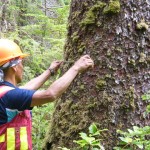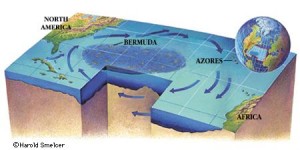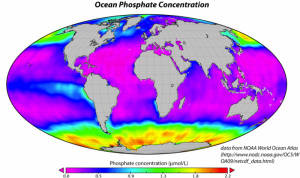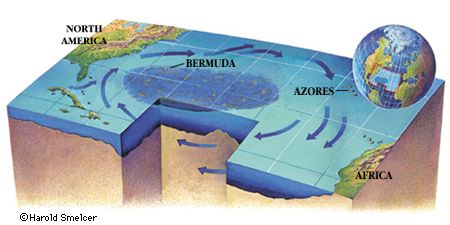
Phosphorus Limitation In Ocean Beaten By Phytoplankton
Phytoplankton — tiny ocean plants — are the most important form of life on Earth. They supply us with most of the oxygen we breathe and manage far more CO2 than all of terrestrial vegetation. Like all other life forms, phytoplankton require the element phosphorus to thrive, but in some parts of the world’s ocean, P is in limited supply. So how do phytoplankton survive and thrive when phosphorus is difficult to find?
The fact that ocean plant life can and does thrive in regions of the world’s oceans where P is in short supply has long been an unexplainable quandry. But as is becoming more and more commonly known, life finds a way.
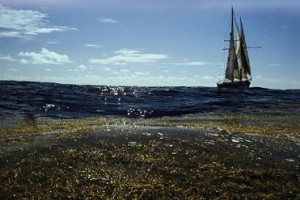 For example in the North Atlantic the famed Sargasso Sea is off the Florida coast, north of Miami, is just such a quandry. It contains vast dense mats of clinging seaweed. The Sangasso Sea is the sluggish centre of a huge whirlpool that rotates slowly clockwise far off the coast of Florida.
For example in the North Atlantic the famed Sargasso Sea is off the Florida coast, north of Miami, is just such a quandry. It contains vast dense mats of clinging seaweed. The Sangasso Sea is the sluggish centre of a huge whirlpool that rotates slowly clockwise far off the coast of Florida.
The Sargasso Sea is roughly the size of Australia, was made by the North Equatorial Current to the south, and the Gulf Stream going clockwise to the sea’s west and north. How is it possible to have such a lush amount of ocean plant life in a region low in vital P.
Life finds a way
It seems phytoplankton can alter their biochemical make-up according to the availability of nutrients in the water. When phosphorus (P) is particularly abundant in the water, phytoplankton produce and store a form of P called polyphosphate, or poly-P, to use later during times when P is less abundant.
Or so we thought.
The accepted wisdom proposed by ocean chemists has long been that poly-P was would be found to be stored in abundance by micro-organisms in waters where P was abundant and would be scarce in waters depleted of P. Of course generations of dogma prone ocean chemists were following the flawed teachings of simple chemistry and ignoring the fact that life is all important and it is not merely chemistry.
So when a group of ocean chemists from the Woods Hole Oceanographic Institution (WHOI) and the Bigelow Laboratory for Ocean Sciences tested that notion, conducted the most comprehensive survey to date of poly-P content and distribution in the western North Atlantic, what they found was surprisingly opposite to what they expected.
Rather than finding low levels of poly-P in the phytoplankton in the Sargasso Sea where P is scarce, they found the phytoplankton were enriched with poly-P when compared to those in the nutrient rich waters in the western North Atlantic. They also found that in low-P environments, poly-P was being more efficiently recycled from sinking particles. Life it seems was managing P to keep it in shallower waters where phytoplankton live and making it available for their use.
“We’ve know that Poly-P existed in phytoplankton for a very long time. The conventional wisdom that phytoplankton made more Poly-P when they had more phosphorus just made so much intuitive sense that few people have worked on this molecule,” said WHOI marine chemist Ben Van Moy, the corresponding author on the study.
“However, there have always been more than a few hints in the literature that the whole story on poly-P was not completely wrapped up. We certainly didn’t set out thinking that we might upend current thinking, and it took us a long time before we would believe our own results. I think the larger message from fundamental discoveries like this is that we have so much more to learn about phosphorus and how phytoplankton deal with its scarcity in certain regions of the sea. Hopefully this paper will be a launching point for a lot of exciting science.”
- P. Martin, S. T. Dyhrman, M. W. Lomas, N. J. Poulton, B. A. S. Van Mooy.Accumulation and enhanced cycling of polyphosphate by Sargasso Sea plankton in response to low phosphorus. Proceedings of the National Academy of Sciences, 2014; 111 (22): 8089 DOI: 10.1073/pnas.1321719111





